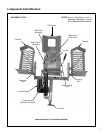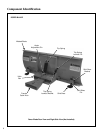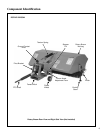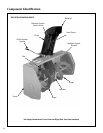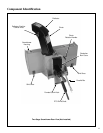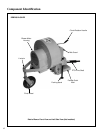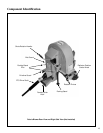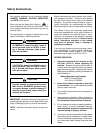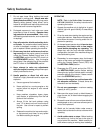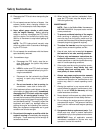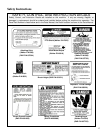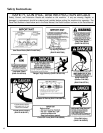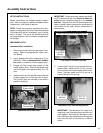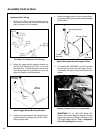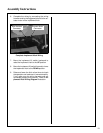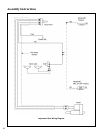
Safety Instructions
15
7. Do not wear loose fitting clothing that could
get caught in moving parts. Always wear ade-
quate protective clothing including long pants.
Wearing safety glasses, safety shoes, and a
helmet is advisable and required by some local
ordinances and insurance regulations.
8. Prolonged exposure to loud noise can cause
impairment or loss of hearing. Operator hear-
ing protection is recommended. Wear a suit-
able hearing protective device, such as earmuffs
or earplugs.
9. Keep all protective shields and safety devic-
es in place. If a protective shield, safety device,
or decal is damaged, unusable, or missing, re-
pair or replace it before operating the machine.
10. Be sure any interlock switches are function-
ing correctly so the engine cannot be started
unless the Forward Speed Control lever is in
the NEUTRAL position and the PTO clutch is in
the DISENGAGED position. Also, the engine
should stop if the operator lifts off the seat with
the PTO clutch in the ENGAGED position.
11. Never attempt to make any adjustments
while the engine is running, except where spe-
cifically instructed to do so.
12. Handle gasoline or diesel fuel with care.
Gasoline is highly flammable and its vapors are
explosive:
a. Use an approved fuel container.
b. Never add fuel to a running engine or hot
engine (allow hot engine to cool several
minutes).
c. Keep matches, cigarettes, cigars, pipes,
open flames, or sparks away from the fuel
tank and fuel container.
d. Always fill the fuel tank outdoors using
care. Fill to about one inch from the top of
the tank. Use a funnel or spout to prevent
spilling.
e. Replace the machine fuel cap and contain-
er cap securely and clean up any spilled
fuel before starting the engine.
OPERATING
NOTE: Refer to the Walker Rider Lawnmowers
OWNER’S MANUAL for safety instructions for
operating the tractor.
1. Operate the machine only in daylight or in good
artificial light with good visibility of areas being
cleaned.
2. Sit on the seat when starting the engine and op-
erating the machine. Keep feet on footrests at all
times when the tractor is moving and/or the im-
plement is operating.
3. An inexperienced operator should learn to steer
(maneuver) the tractor with a slow engine
speed before attempting any operating. Be
aware that, with the front mounted implement
configuration, the back of the machine swings to
the outside during turns.
4. Remember, for an emergency stop, the forward
motion of the tractor can always be stopped by
pulling the Forward Speed Control (FSC) into
the NEUTRAL-PARK position.
5. Disengage the PTO clutch and put the FSC in
the NEUTRAL-PARK position before starting
the engine (an ignition interlock switch normally
prevents starting of the tractor if these controls
are in the OPERATING position).
6. Do not run the engine in a confined area with-
out adequate ventilation. Exhaust fumes are
hazardous and can be deadly.
7. Do not carry passengers - maximum seating
capacity is one (1) person.
8. Make sure the auger, brush, or debris blower is
clear of snow, ice, or debris before engaging the
PTO clutch.
9. Be careful never to throw snow or blow debris to-
wards people or cars, and never allow anyone in
front of the implement.
10. Watch out for hazards hidden under snow or
leaves that could enter the chute or blower while
operating.
11. Avoid sudden starts or stops. Before backing
the machine up, look to the rear to be sure no
one is behind the machine. Watch carefully for
traffic when crossing or working near roadways.



